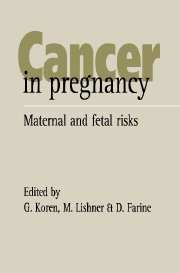Book contents
- Frontmatter
- Contents
- Preface
- List of contributors
- Part I Introduction
- 1 Cancer in pregnancy: identification of unanswered questions on maternal and fetal risks
- 2 The pregnant with malignant disease: maternal–fetal conflict
- 3 Changes in drug disposition during pregnancy and their clinical implications
- 4 The role of the placenta in the biotransformation of carcinogenic compounds
- 5 Antepartum fetal monitoring in the oncologic patient
- 6 The Toronto Study Group: methodological notes
- 7 Motherisk: the process of counselling in reproductive toxicology
- Part II Specific tumors during pregnancy
- Part III Fetal effects of cancer and its treatment
- Index
7 - Motherisk: the process of counselling in reproductive toxicology
from Part I - Introduction
Published online by Cambridge University Press: 06 July 2010
- Frontmatter
- Contents
- Preface
- List of contributors
- Part I Introduction
- 1 Cancer in pregnancy: identification of unanswered questions on maternal and fetal risks
- 2 The pregnant with malignant disease: maternal–fetal conflict
- 3 Changes in drug disposition during pregnancy and their clinical implications
- 4 The role of the placenta in the biotransformation of carcinogenic compounds
- 5 Antepartum fetal monitoring in the oncologic patient
- 6 The Toronto Study Group: methodological notes
- 7 Motherisk: the process of counselling in reproductive toxicology
- Part II Specific tumors during pregnancy
- Part III Fetal effects of cancer and its treatment
- Index
Summary
Introduction
Since its inception in 1985, it has become apparent to members of the Motherisk Program that consultations regarding cancer treatment during pregnancy, albeit rare, are amongst the most difficult to handle (Table 7.1). In addition to the insurmountable emotional and clinical difficulties, the data to base rational risk-benefit analysis were sparse or missing. This was the driving force for the initiation of the studies that have led to this volume. The present chapter will focus on description of the Motherisk Program, its mandate and operation.
Since the thalidomide tragedy, there has been an increased awareness of the potential for drugs, chemicals, and radiation to interfere with embryogenesis and/or development of the fetus. Traditionally, women have relied on their physicians and on the media (books, magazines, and television) for answers regarding concerns about drug exposure during pregnancy. Within the past couple of years, a specialized form of information service (the teratogen information service) has appeared in a number of cities in the United States and Canada. The main function of a teratogen information service is to provide information (in all cases) and consultation (in a few cases) to health professionals and/or the general public who have concerns with respect to drug, chemical, and radiation exposure during pregnancy, to determine any potential risk to the pregnant patient and/or to her unborn child. This chapter describes the Motherisk Program located at the Hospital for Sick Children in Toronto, Ontario, Canada, with special emphasis on its day-to-day operation.
- Type
- Chapter
- Information
- Cancer in PregnancyMaternal and Fetal Risks, pp. 78 - 92Publisher: Cambridge University PressPrint publication year: 1996



